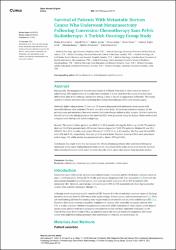Survival of patients with metastatic rectum cancer who underwent metastasectomy following conversion chemotherapy sans pelvic radiotherapy: a Turkish oncology group study

Göster/
Erişim
info:eu-repo/semantics/openAccessTarih
2023Yazar
Almuradova, ElvinaYalcin, Suayib
Arıkan, Rukiye
Ayhan, Murat
Demir, Hacer
Çevik, Gökçen Tuğba
Karaca, Mustafa
Petekkaya, İbrahim
Karabulut, Bülent
Üst veri
Tüm öğe kaydını gösterKünye
Almuradova, E., Yalcin, S., Arıkan, R., Ayhan, M., Demir, H., Cevik, G. T., ... & ALMURADOVA, E. (2023). Survival of Patients With Metastatic Rectum Cancer Who Underwent Metastasectomy Following Conversion Chemotherapy Sans Pelvic Radiotherapy: A Turkish Oncology Group Study. Cureus, 15(5).Özet
Background: The management of early rectal cancer is different from that of colon cancer in terms of radiotherapy (RT) requirements or neoadjuvant treatment. It is not clear how the course of rectal cancer differs from that of the colon in a metastatic setting or how it should be approached differently. This study aimed to evaluate outcomes after combining downsizing chemotherapy (CTx) with rescue surgery.
Methods: Eighty-nine patients (57 men and 32 women) diagnosed with metastatic rectal cancer with resectable disease after systemic CTx were included in the study. All patients underwent surgery for the primary mass and metastasis, but none received radiation therapy before or after surgery. Survival curves for overall survival (OS) and progression-free survival (PFS) were generated using the Kaplan-Meier method and compared with the log-rank test for subgroups.
Results: The median follow-up time was 28.8 (17.6-39.4) months. During the follow-up, 54 (60.7%) patients died and 78 (87.6%) patients had a PFS event. Cancer relapsed in 72 (80.9%) patients. Median OS was 35.2 (95% CI: 28.5-41.8) months, and median PFS was 17.7 (95% CI: 14.4-21) months. The five-year OS and PFS were 19% and 3.5%, respectively. Male sex (p=0.04) and a better Mandard score (p=0.021) were associated with a longer OS, while obesity was associated with a shorter PFS (p<0.001).
Conclusion: Our study is the first to evaluate the effects of metastasectomy after conversion therapy in metastatic rectal cancer independent of colon cancer. As a result of the study, it was seen that the survival after metastasectomy in rectal cancer is worse than the colon cancer data known from previous studies.















